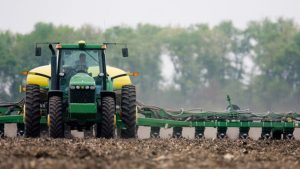The spring planting season is quickly approaching. Are you ready? When most people think of getting ready for the spring planting season, they think of doing maintenance to equipment, ordering seed and fertilizer, and making sure you have all the supplies you need. Did you ever consider reviewing your farm safety protocols to make sure you are ready from that perspective?
Every day, more than 240 agricultural workers and farm employees suffer serious lost-work-time injuries. Five percent of these injuries result in permanent impairment, with the fatality rate for agricultural workers seven times higher than the average for all workers in the private sector. More accidents happen during the spring planting or fall harvest seasons than any other time of the year.
Nobody knows when that next accident is going to occur or who it will involve. But we can take precautions to minimize the risks. With spring season now upon us, it’s easy to see how quickly something can happen. When we are in a hurry, we do things ourselves instead of getting the help we need, and we cut corners instead of taking the proper safety measures. The five minutes you take to get that extra person or put up the safety guards could mean your life. It’s so important to stop, think, and be safe.
Here are a few tips from the American Family Insurance Company to foster a safer environment on your farm.

- Dress for success. Make sure you are wearing the proper clothing and have the needed safety gear for whatever activity you are doing. If you are working around farm equipment, don’t wear loose clothing that can get caught in the PTO shaft. If you are running equipment, wear hearing and eye protection. Use masks to filter dusts and molds, and make sure you have proper gloves and protective clothing when working with chemicals.
- Properly store and mark all chemicals. Whether it is fertilizers and pesticides for the crops or cleaning chemicals in the barn, working with hazardous substances is a necessity of the farming profession. Make sure you know what you are working with and you have the proper training for handling them. Also remember that chemicals can get into your body through your skin, lungs, eyes and mouth. Always be mindful of them, wear protective equipment, and keep them out of children’s reach.
- Prepare for the road. Make sure your farm equipment is properly marked before you travel on public roads. Check your lights to make sure they are working properly, and make sure all reflective tape and slow-moving vehicle signs are properly placed. Also, make sure they are clean and clearly visible.
- Air it out. Too often we hear of tragic accidents occurring when people are working with silos or in manure storage systems. The gases coming from these places can be lethal. Make sure you ventilate an area at least 30 minutes before entering it to remove the concentration of harmful gases. Never work in an area alone without someone outside to help and monitor you. Methane, gas, carbon dioxide, ammonia and hydrogen sulfide can all form in unventilated silos and manure pits.
- Avoid electrical accidents. If you are traveling with tall equipment, always look up to avoid overhead power lines. Always stay 10 feet away to avoid a powerline making contact with your equipment. If a wire is low or on the ground, treat it as if it is energized and avoid it. If someone does come in contact with an energized wire, do not touch that person until the power is turned off.
- Be careful around animals. Remember that animals are unpredictable. No matter how well you think you know your livestock, something could spook them and cause them to react quickly, potentially hurting you. Make sure those employees working with your animals have the proper training to understand that animal’s flight zone and temperament. Also, make sure housing and handling areas are well designed and properly maintained to protect both your employees’ and animals’ safety.
- Keep kids safe. Any of us who grew up on a farm know how fun exploring it can be. However, a farm can also be a place where serious injuries can occur. Always go over the safety rules with your children and remind them often. Also make sure you take the necessary safety precautions to keep them safe: lock silos and bins, don’t let them climb on equipment, fence off manure pits and areas with waters, lock away chemicals and cap abandoned wells and pits, and don’t allow them to ride on equipment unless it is manufacturer-equipped with a second seat and seat belt.
- Take care of you. Long hours on the farm are commonplace this time of year. However, if you’re not getting the proper rest, that can lead to serious accidents on the farm. Feeling fatigued when operating equipment can be dangerous, and you can risk making costly mistakes when you’re not fully aware. Make sure you’re taking breaks from work and are well rested.
As the spring planting season approaches, it is easy to find yourself going from “zero to 60” in the blink of an eye. Taking a few extra minutes to stop and make sure you are creating a Culture of Safety on your farm. Encourage your employees to watch the safety videos posted on our website. Remind folks to “See Something, Say Something” when they come across unsafe conditions. Remind them to always be aware of their surroundings and to make eye contact with the operator before coming near any equipment. Nothing is more important than saving a life or preventing an injury, so make sure your farm is doing everything it can to be safe.
To order our farm safety signs or watch the farm safety videos from the Center, go to our website at www.centerfordairyexcellence.org/farm-safety or call 717-346-0849 to request any of those materials.

